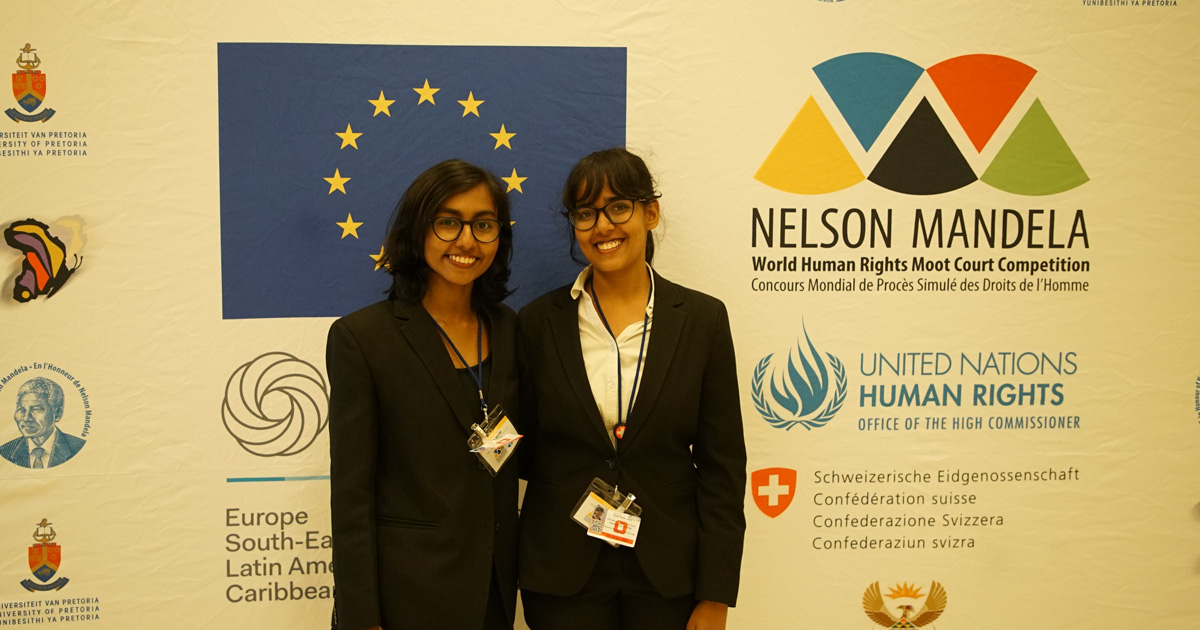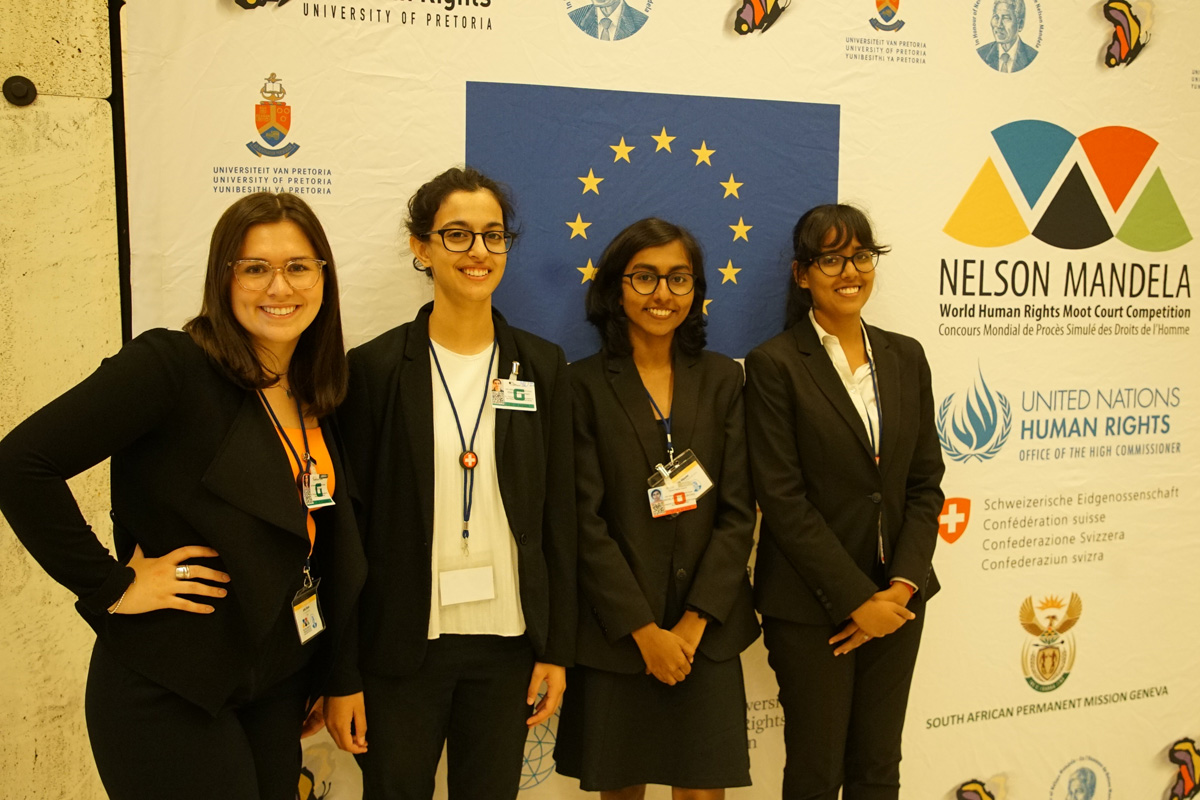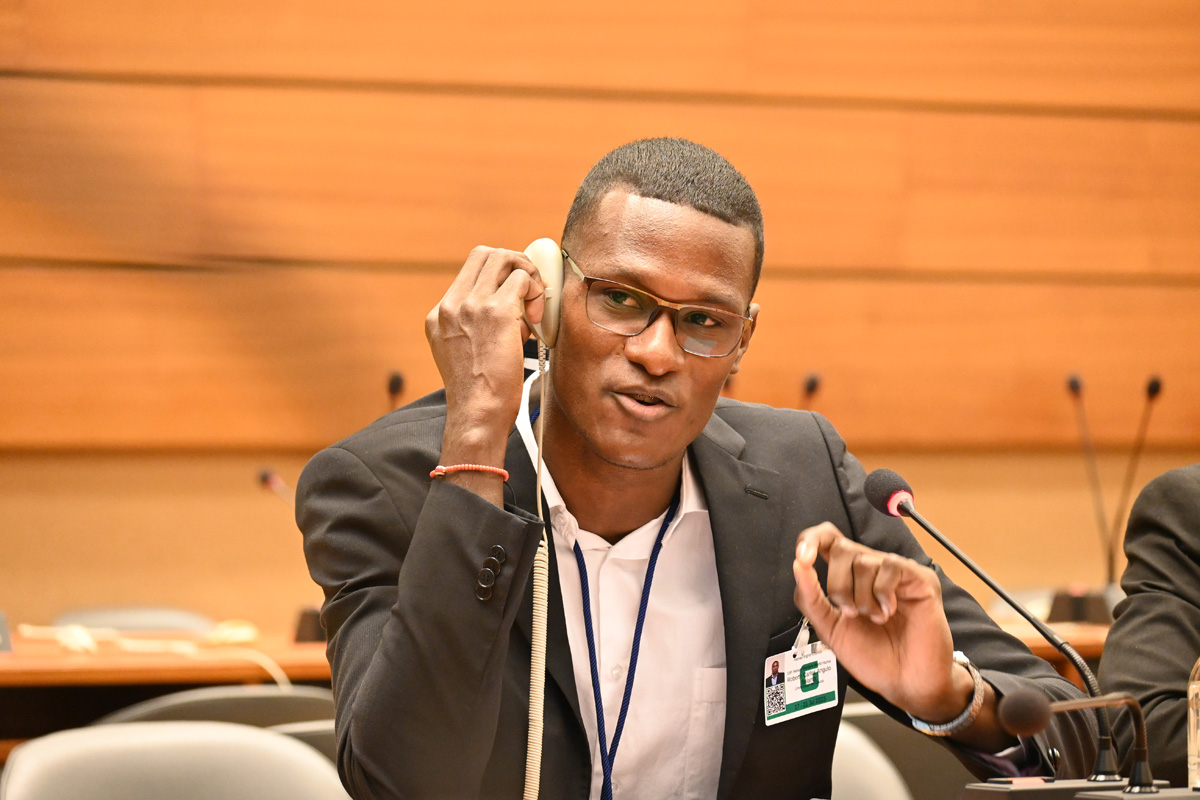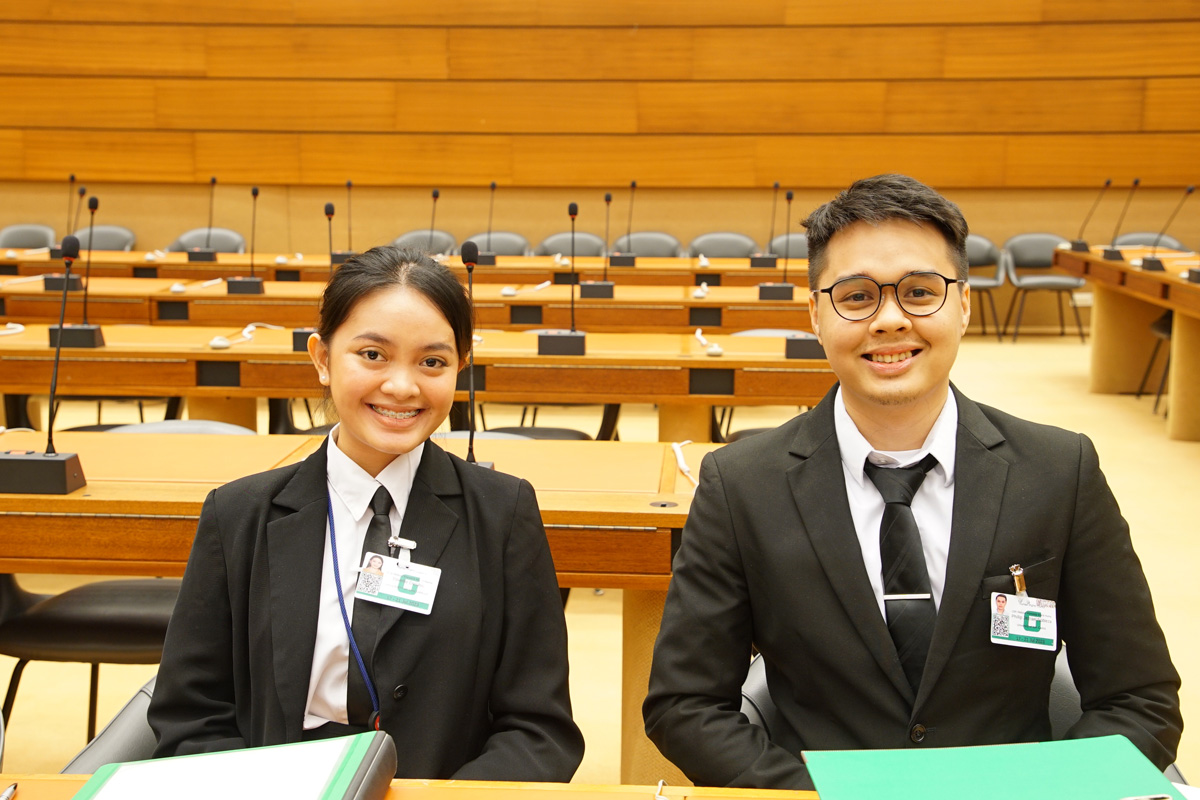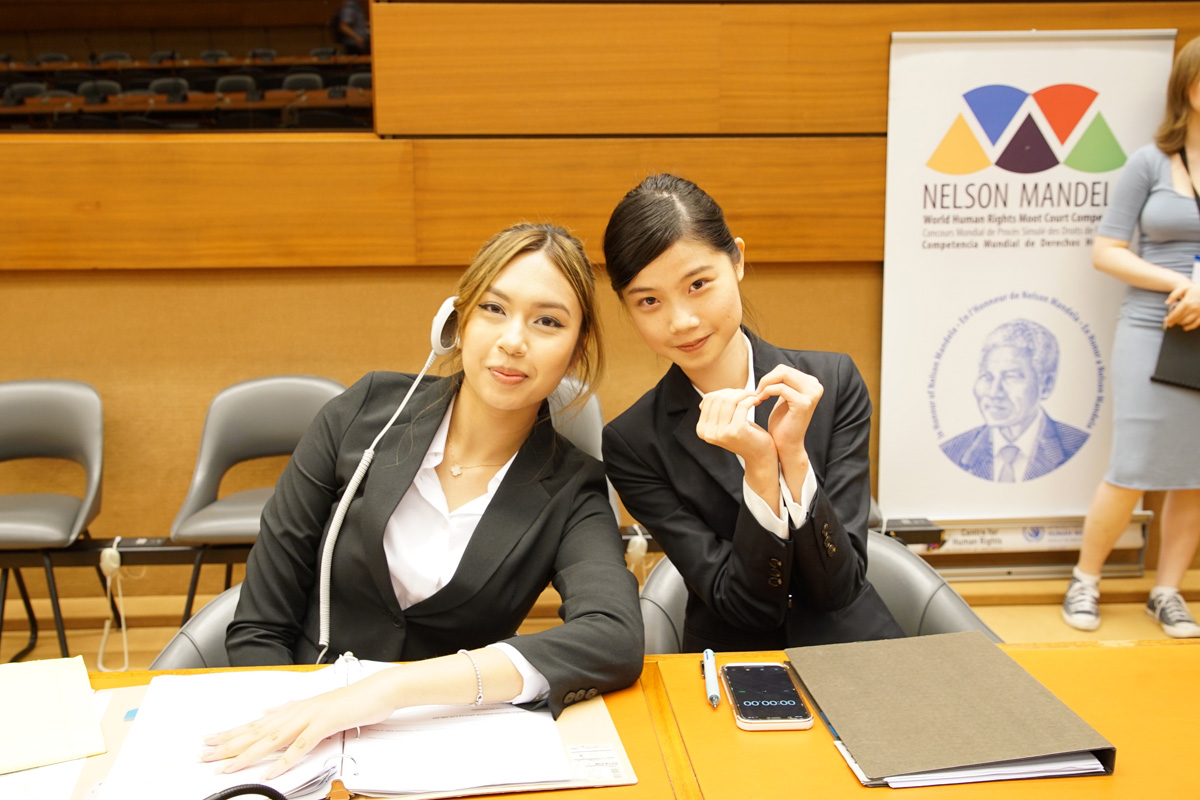The Nelson Mandela World Human Rights Moot Court Competition reached a milestone, with the 15th edition of this Competition being held at the United Nations European headquarters in Geneva, Switzerland. As in 2022, the winning team emerged from the Asian region. This team, the National University of Advanced Legal Studies, Kochi, India, was composed of Akhila Vijayan and Aishwarya Sridhar. The winning team won two Peter Coenen Scholarships for a Summer International Human Rights Implementation Programme at the University of Lucerne in Switzerland. The runner up team was St Thomas University, Canada.
The Centre for Human Rights, Faculty of Law, University of Pretoria, co-hosted the Competition together with the Academy on Human Rights and Humanitarian Law of the Washington College of Law, American University, Washington DC, in collaboration with the Office of the High Commissioner for Human Rights (OHCHR), particularly, the Human Rights Council Branch (HRCB), in Geneva.
In the spirit of the Moot Competition bringing the world together, this year’s edition had participants from 43 universities, from 26 countries, representing the five UN regions, and covering three language groups – English, Spanish and French. The Competition is unique in reaching a broad base of participants, including from those parts of the world where regional human rights systems have not been established, or have only been recently introduced.
The Competition has three phases. In the initial phase, all Universities in the world are invited to submit written heads of argument (‘memorials’). These memorial are assessed, and the 50 best teams, taking into account regional representation, progress to the virtual Preliminary Rounds. The Preliminary Rounds of the Competition took place separately in English, Spanish and French. On the basis of the results during these rounds, the 24 top teams advance to participate in the Advanced Rounds, held in Geneva, at the Palais des Nations.
The Competition, which started in 2009, initially took place in Pretoria, at the University of Pretoria, but has since 2014 been held in Geneva. Due to COVID-19, the 2020 and 2021 editions of the Moot Court were presented fully online, but from 2022 the Competition has adopted a hybrid format. In 2023, the preliminary rounds took place online from 20 to 27 May 2023, and the advanced rounds took place in person from 17 to 21 July 2023.
Final Round: 21 July
The Final Round took place on 21 July 2023 in Room XX in the Palais des Nations, the Human Rights and Alliance of Civilizations Room, where the UN Human Rights Council also holds its deliberations.
The two teams that made it to the final round by advancing through gruelling preliminary and advanced rounds, by surviving an intense quarter-final round, and emerging as winners in the semi-final rounds, are St Thomas University (Canada), National University of Advanced Legal Studies, Kochi (India), the University of Sydney (Australia) and the University of San Carlos (Philippines). St Thomas University (Canada) and National University of Advanced Legal Studies, Kochi (India) advanced to the Final Round.
The Final Round was presided over by a panel of seven esteemed personalities, from the International Criminal Court (Judge Miatta Samba), the Global Campus of Human Rights (its Secretary-General Professor Manfred Nowak), the United Nations International Law Commission (its former Chairperson Professor Dire Tladi), the Office of the United Nations High Commissioner for Refugees (UNHCR) (its Deputy Director for Law and Policy in the division of International Protection, Dr Patrick Eba), the Commonwealth Secretariat (Ms Alithia Barampataz), and two academics (Dr Sanya Samtani, Senior Researcher at the University of the Witwatersrand, and the drafter of the hypothetical case, Associate Professor Thompson Chengeta of the John Moores University).
At the closing ceremony, the Director for Detainee Affairs at the Syrian Emergency Task Force, Mr Omar Alshogre, in his remarks to the participants shared his story of resilience, courage and grit. He shared his time as a political prisoner, the horrors of the pit while also highlighting principles of responsibility, hope and justice. Mr Alshogre also congratulated participants for reaching the final round and celebrated all those who joined the Competition and for their interest and dedication to human rights. Mr Alshogre encouraged participants to seek out what they love, to nurture it, and dedicate themselves to it.
The Director of the Centre for Human Rights, Professor Frans Viljoen, thanked everyone involved in organising the Moot. While emphasising that it is a team effort, in particular of staff of the Centre for Human Rights, he highlighted the dedication and professionalism of the Moot Coordinator, Dr Eduardo Kapapelo. He expressed regret that he participation of a number of teams was not possible due to the refusal or delay in issuing visas.
Nelson Mandela Human Rights Lecture
The welcoming ceremony and Fourth Annual Nelson Mandela Human Rights Lecture took place on 18 July 2023, at the Nations Business Centre Auditorium as part of the opening ceremony of the Nelson Mandela World Human Rights Moot Court Competition. The President of the United Nations Human Rights Council (Ambassador Václav Bálek), the South African Permanent Representative to the United Nations at Geneva (Ambassador Mxolisi Nkosi) and the Chief of the Human Rights Council Branch at the OHCHR (Mr Eric Tistounet), welcomed the participants. The Centre for Human Rights collaborated with the UNHCR in hosting this event.
The Lecture was moderated by Dr Patrick Eba, Deputy Director for Law and Policy in the division of International Protection at the Office of the UNHCR. Ms Gillian Triggs, Assistant Secretary-General and Assistant High Commissioner for Protection at the UNHCR, along with Ambassador Nella Pepe Tavita-Levy, the Permanent Representative of Samoa to the United Nations, discussed the intricacies of the 1951 Convention relating to the Status of Refugees and its 1967 Protocol. They in particular explored its relevance within the context of human-induced climate change. The panellists delved into the challenges surrounding refugee protection and brainstormed strategies to achieve more favourable outcomes.
The speakers emphasised the crucial role of states and international institutions in fostering international cooperation. With a clear recognition of climate change as a global issue that demands collaborative action, the speakers called upon nations to unite and bolster multilateral endeavours to tackle the refugee crisis. During the discussion, the speakers also addressed pertinent matters concerning humanitarian aid and protection. They underscored the importance of amplifying humanitarian assistance and protection measures while advocating for durable solutions to support climate refugees.
Sponsors of the Competition
The World Moot is made possible through the assistance of the Global Campus of Human Rights, the government of Switzerland through its permanent missions in Geneva and its embassy in Pretoria, the Commonwealth, and the South African government through the Permanent Mission to the United Nations in Geneva.
Preliminary Rounds
All registered teams are required to submit written heads of arguments (memorials). These memorials are assessed, and the best teams from each of the 5 UN regions (the top 14 teams from Africa; 13 from Asia; 9 from Latin America and the Caribbean; 8 from the West European and Other; and 6 from East European states), are identified on the basis of the marks awarded for the written memorials. The best teams qualify to participate in the preliminary rounds.
In 2023, the World Moot brought together the following 45 participants, selected based on the marks awarded to their written heads of argument, for the preliminary rounds:
Africa Group (14 teams)
|
Democratic Republic of Congo |
Université Catholique du Congo |
|
Democratic Republic of Congo |
Université Officielle de Bukavu |
|
Kenya |
Moi University |
|
Kenya |
Kabarak University |
|
Kenya |
Strathmore University |
|
Malawi |
University of Malawi |
|
Nigeria |
University of Lagos |
|
Nigeria |
University of Calabar |
|
South Africa |
EDUVOS |
|
South Africa |
University of the Witwatersrand |
|
Tanzania |
Muslim University of Morogoro |
|
Zimbabwe |
Midland State University |
|
Zimbabwe |
Zimbabwe Ezekiel Guti University |
|
Zimbabwe |
University of Zimbabwe |
Asia Pacific Group (13 teams)
|
Cambodia |
National University of Management |
|
India |
Hidayatullah National Law University |
|
India |
Institute of Law, Nirma University |
|
India |
Jindal Global Law School |
|
India |
Kirit P Mehta School of Law, Mumbai |
|
India |
Maharashtra National Law University Mumbai |
|
India |
Dr Ram Manohar Lohia National Law University, Lucknow |
|
India |
National University of Advanced Legal Studies, Kochi |
|
India |
Christ (deemed to be) University, Bengaluru |
|
India |
West Bengal National University of Juridical Sciences, Kolkata |
|
Malaysia |
University Utara Malaysia |
|
Philippines |
University of San Carlos |
|
Singapore |
National University of Singapore |
Latin America & Caribbean Group (7 teams)
|
Argentina |
University of Buenos Aires |
|
Argentina |
Universidad Nacional de Cuyo |
|
Brazil |
University of Sao Paulo |
|
Bolivia |
Universidad Católica Boliviana San Pablo - Sede Cochabamba |
|
Colombia |
Universidad del Cauca |
|
Guatemala |
Universidad de San Carlos de Guatemala |
|
Mexico |
Universidad de Guadalajara |
Western Europe & Others Group (8 teams)
|
Australia |
University of Sydney |
|
Canada |
St Thomas University |
|
Ireland |
The Law Society of Ireland |
|
Italy |
University of Bologna |
|
Netherlands |
Maastricht University |
|
Switzerland |
University of Lucerne |
|
United Kingdom |
Centre for Transnational Legal Studies |
|
United Kingdom |
Oxford University |
Eastern European Group (3 teams)
|
Hungary |
University of Public Service |
|
Russian Federation |
Kutafin Moscow State Law University |
|
Serbia |
University of Niš |
Results: Memorials (written heads of argument)
Best Spanish-language memorials
Universidad Nacional de Cuyo, Argentina
Best English-language memorials
- University of Buenos Aires, Argentina - 86.25%
- University of Lucerne, Switzerland - 81.75%
- Institute of Law Nirma, India - 81.5%
- Dr Ram Manohar Lohia National Law, India - 81.5%
- University, Lucknow, India - 80.75%
- University of Oxford, United Kingdom - 80%
- Kabarak University, Kenya - 79.25%
- University of Malawi - 78.75%
- University of Sydney, Australia - 78.30%
- Kutafin Moscow State Law University, Russia - 78.25%
Results: Best teams in the Preliminary Rounds
Top two teams in the French-language Preliminary Rounds
- Université Officielle de Bukavu - 70.5%
- Université Catholique du Congo - 60.8%
Top five teams in the Spanish-language Preliminary Rounds
- Universidad del Cauca - 82.02%
- Universidad de San Carlos de Guatemala - 76.54%
- Universidad Nacional de Cuyo - 72.92%
- Universidad de Guadalajara - 66.17%
- Universidad Católica Boliviana San Pablo - Sede Cochabamba - 59.88%
Top ten teams in the English-language Preliminary Rounds
- St Thomas University - 89,25%
- University of Oxford - 88,46%
- University of Buenos Aires - 87,94%
- National University of Singapore - 86,33%
- Midlands State University - 86,15%
- University of Sydney - 85,77%
- University of San Carlos, Philippines - 85,69%
- Hidayatullah National Law University - 84,22%
- University of Sao Paolo - 83,87%
- 10. National University of Advanced Legal Studies, Kochi - 83,37%
Results: Best oralists in the Preliminary Rounds:
Best oralist in the French-language Preliminary Rounds
Noblesse Buhendwa
Best oralist in the Spanish-language Preliminary Rounds
Victor Manuel Ruiz Burbano
Best oralist in the English-language Preliminary Rounds
- Julia Evans St Thomas University
- Luca Geary University of Oxford
- Elisha Gunaratnam St Thomas University
- Fiorella Giselle Cesa University of Buenos Aires
- Lucy Ryder University of Oxford
Advanced ‘Round of 24’: Eight teams qualifying for Quarter-Finalists
After the ‘Round of 24’, the following 8 teams advanced to the quarter-finals:
- 1. St Thomas University (Canada) 94.17%
- 2. University of Oxford (United Kingdom) 93%
- 3. University of Sydney (Australia) 89.67%
- 4. University of Buenos Aires (Argentina) 88.33%
- 5. University of San Carlos (Philippines) 86.83%
- 6. University of Lagos (Nigeria) 81.33%
- 7. National University of Advanced Legal Studies, Kochi (India) 85.83%
- 8. Universidad de San Carlos de Guatemala (Guatemala) 83.17%
Semi Finalists
National University of Advanced Legal Studies, Kochi (India)
St Thomas University (Canada)
University of San Carlos (Philippines)
University of Sydney (Australia)
Finalists
National University of Advanced Legal Studies, Kochi (India)
St Thomas University (Canada)
Winning Team
National University of Advanced Legal Studies, Kochi (India)
For more information, please contact:
